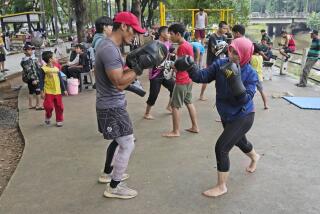Regional Outlook : Relief Elusive for Asia’s Labor Pains : Indonesia’s leaders fear higher wages and improved conditions would deter foreign investment. But workers are fed up. Strikes have doubled since last year.
- Share via
TANGERANG, Indonesia — A 21-year-old woman with little formal education and bleak prospects, Rasiya never considered herself a radical. But she did not hesitate when her fellow workers got up from their sewing machines and marched out on strike.
Rasiya is one of 6,000 young women employed by an ethnic Chinese businessman to make Adidas sports shoes for the American and European markets. The shoes cost more than $100 a pair when they finally reach the boutiques of the West, but the workers take home only $1.39 a day.
“It’s not enough to live on in the big city,” protested Rasiya, a whippet-thin seamstress who shares a tiny house in this dusty factory town with her husband and child.
The October strike ended after only two days, however, with none of the workers’ demands met. “The police came and told us that, if we did not return to work, we would get fired,” Rasiya recalled. “We were afraid of what might happen.”
Indonesia’s dilemma is common in Asia: Faced with a population of 180 million and 2.3 million people streaming into the work force each year, the government insists that investing in improved labor conditions too quickly would prohibit the country from being competitive with low-wage nations such as China and throw people out of work.
In this calculation, labor rights take a back seat to exports in the nation’s development planning. There is only one legal labor union, and it tends to place corporate interests ahead of workers’ rights. A minimum-wage law guarantees $1.89 a day, but even the government admits that the law is widely flouted.
Rasiya’s town of Tangerang is only 17 miles from Jakarta, but the warren of factories and barracks-style housing is a world apart from the mirrored skyscrapers that a foreign visitor encounters when arriving in the country’s capital.
Conditions in teeming factory towns such as Tangerang represent what labor activists describe as the reverse side of the coin in the debate about free trade, which received a ringing endorsement at last month’s Asia-Pacific Economic Cooperation forum attended by President Clinton.
While labor strife has become a long-term threat to the stability of countries such as Indonesia and one of the most contentious issues dividing the developed world from the developing countries of Asia, workers’ rights were discreetly kept off the agenda at the APEC conference. But they were hotly debated in the corridors outside.
Under the authoritarian rule of President Suharto, who has governed Indonesia for nearly three decades, the country has experienced remarkable growth, with the per capita gross national product increasing an average of 4% a year for the past 12 years. In the past decade, manufacturing has overtaken oil as the country’s largest export industry, meaning thousands of jobs have been created. A large middle class has emerged.
But the boom was made possible largely because foreign manufacturers found in Indonesia a huge supply of workers ready to work for a pittance. Yayasan Komunikasi Masyarakat, a Christian welfare organization, published a pamphlet last year in which it charged that the $20 million that Nike Inc. paid Michael Jordan for his endorsement of Nike footwear was about the same as the amount the company spent in Indonesia for the labor to make 19 million pairs of shoes.
Footwear and textile companies such as Nike and Reebok have few of their own employees in Indonesia, contracting their work out to Korean- or locally owned factories, which leaves the shoe giants with little control over labor practices at the factory level. “Companies like Nike can put a pair of $150 shoes on the docks with only 35 or 40 cents of labor,” said Charles Gray, head of international affairs for the AFL-CIO in Washington. “I think that’s criminal almost. Certainly greedy.”
For more than five years, the U.S. government has been investigating charges that the Indonesian government denies workers the right to freely associate, because the regime permits only one union, and it’s state-controlled. Washington can revoke benefits under the Generalized System of Preferences, covering about $650 million in imports, if the charges are upheld, but the review was shelved in August to permit the two sides to carry out a “dialogue” on the issue.
While Indonesian government officials maintain that significant progress has been made for workers, labor activists contend that the situation is gloomier now than it has been in years.
“They are talking about paper progress, but I think the government is going backward,” said one trade union activist who spoke on condition of anonymity.
The contradiction was dramatically visible during Clinton’s visit. On one hand, the government announced a “comprehensive” package of labor reforms designed to improve workers’ welfare, including increased government mediation of strikes and encouragement of work-site labor unions. But at the same time, it jailed the leader of the country’s largest unsanctioned union for three years on contested charges of causing unrest.
Muchtar Pakpahan was among 14 union leaders brought to trial for allegedly inciting violence during labor unrest in Medan on the island of Sumatra in April. Thousands of workers went on a rampage in the city, leaving one businessman dead. Pakpahan was in Jakarta, on the island of Java, at the time of the violence.
The U.S. State Department released a statement deploring the three-year term imposed on Pakpahan as “unwarranted.” “We believe he should not be held accountable for unintended violence in connection with protests over legitimate labor demands,” it said.
The union’s offices in an eastern suburb of Jakarta are nearly deserted now, a far cry from the heady days when the union claimed 350,000 members in more than 90 branches nationwide. “The government is trying to crush our union by sentencing our chairman to jail,” said Tohap Simanungkalik, head of the group’s research department. “Our members have become afraid to talk openly.”
While the Pakpahan case has attracted the most attention overseas, it is the story of a woman named Marsinah that has proved an inspiration to many activists who have risen up against what they consider unfair working conditions.
Marsinah, who like most Javans used only one name, became a labor activist at a watch factory in Surabaya and led a strike demanding that a 25-cent meal allowance be incorporated into the company’s 84-cent daily wage. Marsinah was abducted, raped repeatedly and killed. Her body was dumped by a roadside in May, 1993.
Marsinah’s death provoked a nationwide outcry. Eight people were sentenced to prison in the case, including the owner of the factory where she worked, who got a 17-year term. But human rights groups maintain that confessions used against the accused were coerced to protect others who were involved in her death--a suggestion that military officials might be implicated--and the country’s high court recently overturned some of the sentences on appeal.
Despite the outrage provoked by the Marsinah case, four other labor activists have been murdered in the past year, according to trade union leaders. Two were officials in Pakpahan’s union.
Labor unrest is on the rise, too. According to official figures, the number of strikes in Indonesia has risen this year to 367, nearly double the 185 walkouts recorded during all of last year. “Some companies really are not aware about workers’ regulations, while others deliberately violate the regulations because they feel burdened,” Manpower Minister Abdul Latief noted during a meeting with investors last month.
While the number of strikes is relatively small for a country the size of Indonesia, most workers in the country have no idea what unions are or what rights workers have. With unemployment high, activists say most workers are still unwilling to risk the wrath of their employers.
In January, the Indonesian government raised the minimum wage. It varies from region to region, but in cities such as Jakarta the minimum is $1.89 a day. Employers only have to pay 75% in cash, deducting the rest for transport or food.
“It is very, very hard to live on such little wages,” said Teten Masduki, head of the labor division of the Indonesian Legal Aid Foundation. “Last year, 90% of the strikes were about companies failing to pay even those wages.”
In February, the government appeared to be implementing a major reform by announcing that the military would be banned from intervening in labor disputes. But in the first month alone, activists said the army intervened in 30 strikes.
“When something happens in a factory, the first outside unit to arrive is the military. This is how they get money. Often companies hire a military man as the director of personnel,” said Indera Nababan, director of a non-governmental group that offers counseling to workers.
While the government is considering allowing factory workers to organize house unions and negotiate their own contracts, it remains implacably opposed to the formation of a free-trade union along the lines of Pakpahan’s group.
Western nations, led by the United States and France, have drafted a social clause covering workers’ rights for the World Trade Organization, the designated successor organization to the General Agreement on Tariffs and Trade. But the social clause’s demands that countries mandate minimum wages and reasonable work hours, and ban child labor have provoked outrage in countries such as India and Indonesia, which depend heavily on low-cost labor to attract foreign investment.
More on Labor
Reprints of “Rich-Poor Gap Widens Around the Globe,” a June 14 World Report story, are available from Times on Demand. Call 808-8463, press *8630 and select option 1. Order item No. 6028. $1.95.
More to Read
Sign up for Essential California
The most important California stories and recommendations in your inbox every morning.
You may occasionally receive promotional content from the Los Angeles Times.










